Anomalous forms of cacti in Nikitsky Botanical Garden, Yalta, Ukraine
By Peter Lapshin (Moscow, Russia)
Translated into English by Vsevolod Goloviznin (Sevastopol, Urkaine)
Crimean peninsula is located in the east of Europe in northern part of Black sea (fig. 1). Nikitskiy botanical garden is located in the south of the Crimean peninsula, in east part of Yalta (fig. 2). The "The Cactus greenhouse" is the part of rhe garden and is close to the bottom part of park. Our magazine already wrote about Nikitskiy botanical garden in 22 issue, the article is called: "Nikitskiy botanical garden - a national science centre". We already showed abnormal forms of cacti from a collection of this garden in 2003. The material about them is published in issue 24. Now we will continue this theme and we suggest one more selection of interesting plants. Photos are made by E.D.Korotaev and P.V.Lapshin in July, 2007.
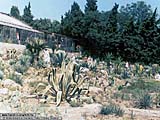
| 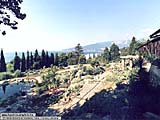
|
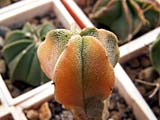
Astrophytum myriostigma f. variegata
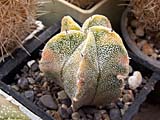
Astrophytum myriostigma f. variegata
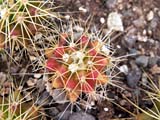
Echinocereus hankokii f. variegata
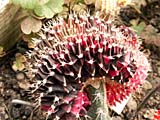
Gymnocalycium mihanovichii f. variegata f. cristata
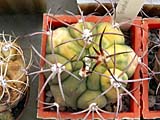
Gymnocalycium saglione f. variegata
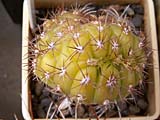
Gymnocalycium f. variegata cristata
| | | | | |
The botanical garden was founded in 1812 and is one of the oldest in Europe. From the first years of its existence different experiments on introduction of various succulents in an open ground in conditions of Southern coast of Crimea were made. Minimum winter temperatures in the garden are about 15 degrees above zero. It imposes restrictions on specific structures of plants. Opuntia vulgaris, O. humifusa were successfully introducted in the XIX century. In 1913 Agaves, Yuccas, Prickly pears, Sedums and other succulents grew in the street.
During Soviet times in the general collection of plants of Nikitskiy botanical garden it was about 28 thousand species and forms of plants in the opened and closed ground. The collection of cacti contains 600 taxa from 118 genera, the succulent collection contains about 500 taxons from 67 genera and 17 families. Mammillaria (150 species), Gymnocalycium (45 species), Opuntia (34 species), Crassulaceae (155 species), Aizoaceae (64 species) are most widely represented.
In greenhouse conditions over 50 % of cacti and 65 % of others succulents are blossom. It is possible to observe blossoming plants during all the year. The peak of flowering of cacti falls at spring and summer time when 70-120 taxons blossom at one time. The minimum of blossoming cacti, 10-20 species is marked in autumn. The peak of flowering leaf succulents fall on spring, a minimum on July and December.
In addition about plants you can read Eugeny Erohin's article in the issue 24th of our magazine: "Cactus greenhouse of Nikitskiy botanical garden" where the author tells about some unique plants from a collection of cacti and shares the experience of their cultivation in conditions of Nikitskiy botanical garden.
Olga Ivanovna Goncharova manages the greenhouse. Olga Nikolaevna Masjuk supports the collection.
Cactus greenhouse of Nikitskiy garden has a site in the Internet. On a site it is possible to make virtual excursion to parks of Nikitskiy garden, to the exposition of cacti and other succulents in an open ground (so-called "A cactus yard ") and in the closed ground on the site. The extensive photo gallery of separated succulent plants is also represented.
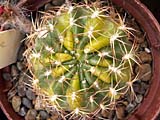
Lobivia tiegeliana f. variegata
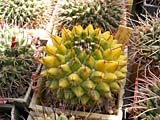
Mammillaria sp. f. variegata
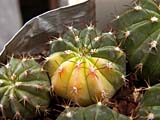
Melocactus sp. f. variegata

Myrtillocactus geometrisans f. cristata
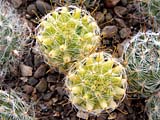
Mammillaria sp. f. variegata
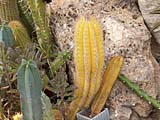
Pilosocereus hybr. f. variegata
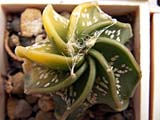
Astrophytum capricorne f. variegata
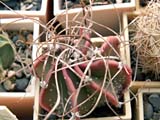
Astrophytum capricorne f. variegata
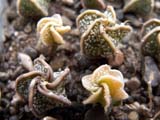
Astrophytum capricorne f. variegata
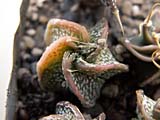
Astrophytum capricorne f. variegata
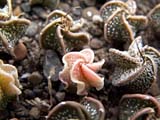
Astrophytum hybr capricorne X ornatum f. variegata
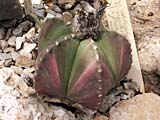
Astrophytum myriostigma nudum f. variegata
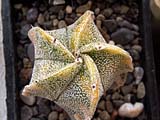
Astrophytum myriostigma f. variegata
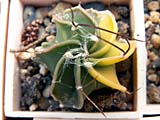
Astrophytum ornatum f. variegata
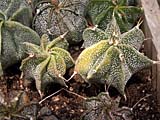
Astrophytum ornatum X capricorne f. variegata
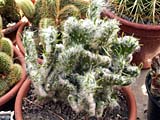
Austrocylinropuntia vestita cristata
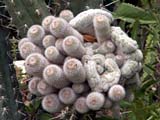
Cleistocactus strausii cristata
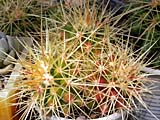
Echinocereus hankokii f. variegata
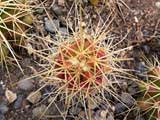
Echinocereus hankokii f. variegata
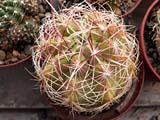
Echinomastus sp f. variegata
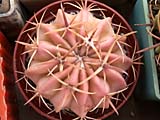
Ferocactus latispinus hybr. f. variegata
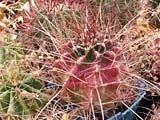
Ferocactus sp. f. variegata
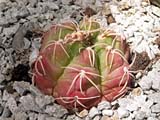
Gymnocalycium denudatum hybr. f. variegata
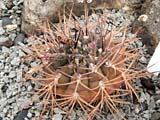
Gymnocalycium hybopleurum hybr. f. variegata
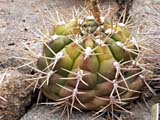
Gymnocalycium hybr. hypopleurum f. variegata
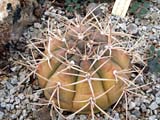
Gymnocalycium hybr. f. variegata
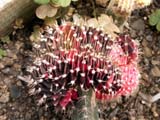
Gymnocalycium mihanovichii f. variegata f. cristata
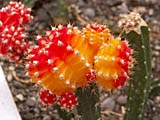
Gymnocalycium mihanovichii f. variegata
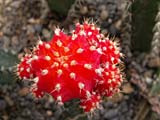
Gymnocalycium mihanovichii f. variegata
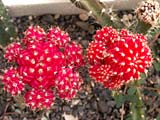
Gymnocalycium mihanovichii f. variegata
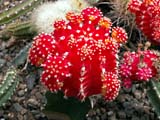
Gymnocalycium mihanovichii f. variegata
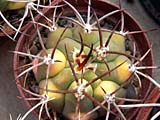
Gymnocalycium saglione f. variegata
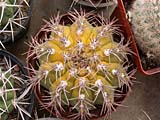
Gymnocalycium f. variegata
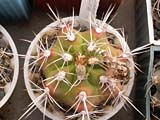
Gymnocalycium f. variegata
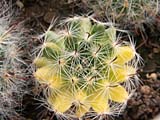
Mammillaria sp. f. variegata
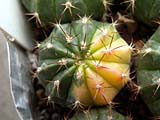
Melocactus sp. f. variegata
| | | | | | | | | | | | | | | | | | | | | | | | | | | | | | | | | | | |





